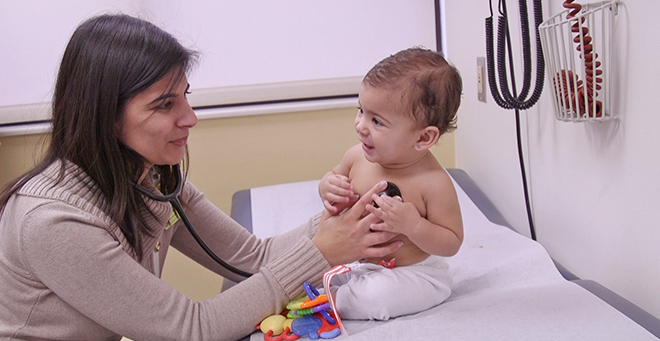A UMass Chan Medical School pilot study in which Central Massachusetts parents of children with asthma were sent text message medication reminders during the COVID-19 pandemic school closures demonstrated feasibility and acceptance of the text messaging and improved health outcomes for the children.

The study, which was published Jan. 30, in Pediatric Pulmonology, was led by Michelle Trivedi, MD, MPH, associate professor of pediatrics, pediatric pulmonologist and asthma clinical researcher. T.H. Chan School of Medicine second-year students Juliana Arenas and Sarah Becker contributed to the research.
“We know preventive inhalers work really well, but they don’t work if you don’t take them,” Dr. Trivedi said. “Asthma disproportionally impacts families from disadvantaged backgrounds and communities of color. Families of children with asthma experience many competing demands, like working multiple jobs and trying to put food on the table, and we were hoping to support them with ensuring their child gets their preventive asthma medicine.
“During school closures, we were able to link the school system to these families and to the clinical system at a time when largely all of these groups were siloed and isolated but working towards the same goal of improving a child’s asthma.”
The observational study coincided with the COVID-19 pandemic, in which most schools shut down in-person learning. Students with uncontrolled asthma would normally receive their daily inhaler with their school nurse through Trivedi’s program, Asthma Link. However, during COVID-related school closures, these students and families were separated from that avenue of support. But even before the pandemic, Trivedi explained, health researchers were looking for other ways to support school-based, preventive care during school vacations, holidays and weekends.
In December 2020, researchers recruited children enrolled in school-supervised asthma therapy in Central Massachusetts to participate in this school-linked text message intervention, called Remote Asthma Link. Their parents or guardians were sent two-way, automated, daily text reminders in English or Spanish, asking if they had given their child their daily preventive asthma medicine. Researchers notified the school nurse if the parent or guardian did not consistently respond to text messages. School nurses performed weekly remote check-ins with all families.
Twenty-six children and their caregivers were enrolled in the intervention with 96 percent retention at six months.
Caregiver response rate to daily text messages was 81 percent over the study period. And children experienced significant improvements in asthma health outcomes, such as fewer symptom days between baseline and follow-up, fewer emergency visits and asthma-related hospital admissions, fewer oral steroid courses, and greater medication adherence.
Trivedi said that the national average rate of pediatric asthma is 8 percent, but in Worcester it can be as high as 20 percent.
Researchers highlighted the impact, borne out in this pilot, that school nurses can have on the health care of children, particularly the most vulnerable ones.
“Part of what drives me to pursue medicine as a career path is promoting health equity,” medical student Arenas said. “There are a lot of inequities when it comes to asthma outcomes and, especially at the beginning of the pandemic, there were also a lot of inequities in terms of school closures. And so, I was really interested in how this project could be a community-based intervention to promote health equity.”
Becker agreed, adding that as a Holden native, she was drawn to the project because, “I got to do good in the community firsthand and be involved in taking a lead on that project. In many things in research, you don’t get to see the fruits of your labor. I think this project allowed us to make an impact and we could see it blossom.”
Arenas and Becker made calls to parents and conducted surveys to get their feedback.
“This response rate really supported that this could be an intervention method that could be used in the future, too,” said Arenas. “It was great talking to parents and seeing how much they truly valued this program.”
The next phase for Remote Asthma Link is to talk to the nurses, families and providers who participated to understand more deeply what worked and what didn’t, Trivedi said. She then plans to refine the program and deploy it in a clinical trial to test it against a comparison group.
“It provided a great proof of concept here. I really believe that this is a potential strategy that is accessible and practical for families, and that we could mitigate some of the inequities in childhood asthma by connecting clinics, schools and families through a remote system,” said Trivedi. “The biggest goal is that this can be something we use for the greater good of child health equity.”
Related UMass Chan news story:
K Club at UMass Medical School prepares new investigators for independent funding